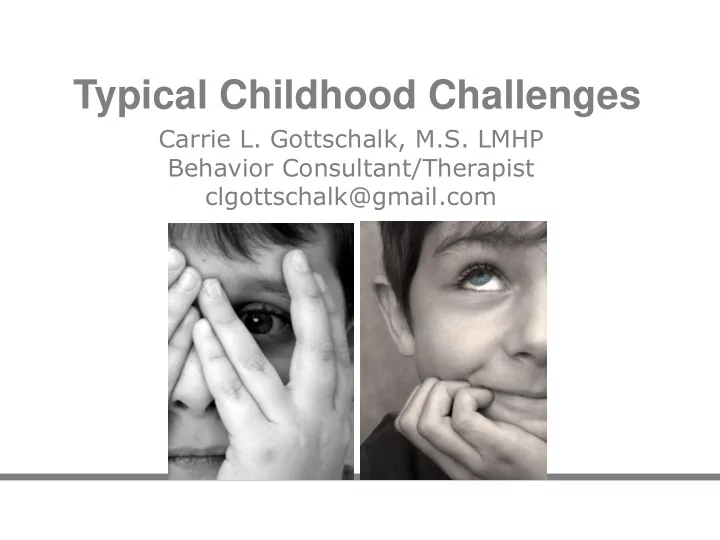

Typical Childhood Challenges Carrie L. Gottschalk, M.S. LMHP Behavior Consultant/Therapist clgottschalk@gmail.com
The Goals 1. Preserving the relationship 2. Creating lasting, positive behavior change What does work? What doesn’t work? Positive attention Yelling, name calling, Encouragement insults, berating Trust, safety, No follow through predictability Too many warnings FUN Giving in
Behaviors that concern us . . .
Behavior serves a function
Getting OFF the Hamster Wheel We get stuck in a habitual pattern of behavior. 1. It’s what I’ve always done. 2. I don’t know what else to do.
A Three-Part Approach PRAISE AISE PREVENTION ACCOUNTABILITY
Effective Praise/Acknowledgment • Immediate • Specific (show and tell) • Ratio 4:1
Tipping the Scales: Negative too strong
Tipping the Scales TO YOUR ADVANTAGE
Preventive Teaching
Elements of Prevention • Understanding ages and stages • Understanding temperament • Understanding Maslow • Understanding Prevention
Teaching Social Skills • Accepting . . . • Following instructions
Appropriate responses
More appropriate responses . . . Check yourself first : • Are you making a mountain out of a mole hill? • Are you delivering conflicting messages? (What kind of role model are you?) • Are you accidentally teaching them not to listen?
Are you wrestling with a pig in the mud?
Avoiding “The Hole” You can’t NO TEACHING CHING rationalize HERE!! E!! with irrationality
Consequences *Immediate *Appropriate *Meaningful • Prompt • Start with • Redirect empathy • Redo/Overlearn • Acknowledge and validate • Undo feelings • Loss of item, privilege or time
Recommended Websites • Love & Logic: www.loveandlogic.com • Boys Town: www.parenting.org
GENERAL BEST PRACTICE: • Common Sense Parenting of Toddlers and Preschoolers by Bridget Barnes and Steven M. York, M.H.D. • Common Sense Parenting by Ray Burke, Ron Herron, and Bridget A. Barnes. • Parenting with Love And Logic by Foster Cline and Jim Fay • Go to Your Room! Consequences that teach. A common-sense guide to improving your child’s everyday behavior by Shari Steelsmith • The Pocket Parent: What to do when your 2- 5-year-old has tantrums, bites a friend, keeps interrupting, uses bad words, won’t use the potty, and more . . . by Gail Reichlin and Caroline Winkler • Good Night, Sweet Dreams, I Love You, Now Get Into Bed and Go To Sleep! How tired parents can solve their children’s bedtime problems by Patrick C. Friman, Ph.D.
DEFIANCE & ANGER: • The Kazdin Method for Parenting the Defiant Child by Alan Kazdin, Ph.D. • Setting Limits With Your Strong-Willed Child: Eliminiating conflict by establishing clear, firm, and respectful boundaries by Robert J. MacKenzie, Ed.D. • No More Meltdowns Positive strategies for managing and preventing out-of- control behavior by Jed Baker, Ph.D. • The Explosive Child by Ross W. Greene, Ph.D. JUST FOR KIDS: • Josh’s Smiley Faces : A story about anger by Gina Ditta-Donahue • When My Worries Get Too Big! A relaxation book for children who live with anxiety by Kari Dunn Buron
Recommend
More recommend